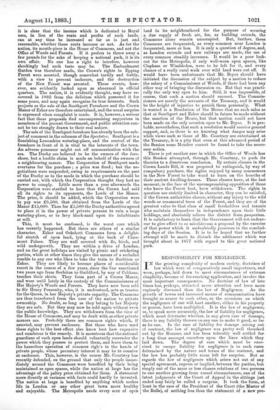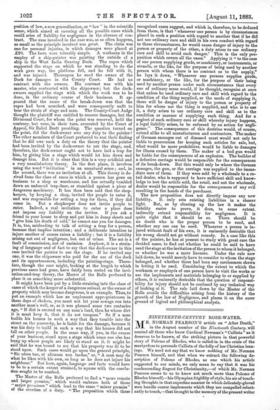RESPONSIBILITY FOR NEGLIGENCE.
IN the growing complexity of modern society, doctrines of law which were of comparatively small importance, and were, perhaps, laid down to meet circumstances .of extreme simplicity, become of far-reaching application, and involve the most important consequences. No doctrine of law of late times has, perhaps, attracted more attention and been more copiously discussed than the law of Negligence. As the growth of towns and increased means of communication have brought us nearer to each other, so the occasions on which the negligence of one will hurt another, either in his property or person, have been multiplied. It is the law of negligence, or, to speak more accurately, the law of liability for negligence, which must determine whether, in any given case of damage, there is any liability thrown on any one to make it good, so far as he can. In the case of liability for damage arising out of contract, the law of negligence was pretty well thrashed out by the Romans, and has been tolerably well settled for a long time amongst ourselves upon the lines which they laid down. The degree of care which must be exer- cised to escape liability for negligence is in such cases determined by the nature and terms of the contract, and the law has probably little room left for surprise. But as regards the law of negligence which arises not out of any special agreement, express or implied, between the parties, but simply out of the more or less chance relations of two persons to one another growing from casual circumstances, one of the latest judgments of the Court of Appeal in the sittings just ended may fairly be called a surprise. It took the form, at least in the case of the President of the Court (the Master of the Rolls), of nothing leas than the statement of a new pro-
position of law, a new generalisation, or " law " in the scientific sense, which aimed at covering all the possible cases which could arise of liability for negligence in the absence of con- tract. The sum involved in the case was, as so often happens, as small as the principle involved was great. The claim was one for personal injuries, in which damages were placed at £20. The facts were tolerably simple. A workman in the employ of a ship-painter was painting the outside of a ship in the West India Graving Dock. The ropes which supported the stage on which he was standing to do the work gave way, the platform fell, and he fell with it, and was injured. Thereupon he sued the owner of the Dock for damages in the County Court. He had no contract with the owners. His contract was with his master, who contracted with the shipowner ; but the dock- owners supplied the stage with which the work was to be
done, in the ordinary course of their business. It ap- peared that the cause of the break-down was that the ropes bad been scorched, and were consequently unfit to bear the strain of stage and man. The County-Court Judge thought the plaintiff was entitled to recover damages, but the Divisional Court, for whom the point was reserved, held the contrary, but were, in their turn, overruled by the Court of Appeal, Sir Baliol Brett presiding. The question turned on the point, did the dock-owner owe any duty to the painter? The other members of the Court preferred to rest their finding that he did owe such a duty on the theory that the painter had been invited by the dock-owner to use the stage, and, therefore, the dock-owner ought not to have laid a trap for him, by giving him a stage which would let him down and damage him. But it is clear that this is a very artificial and a very unsatisfactory theory. In the first place, it involves using the word " invitation " in an unnatural sense ; and, in the second, there was no invitation at all. This theory is de- rived from the class of cases in which a person has gone on business to a shop or warehouse, and has actually tumbled down an unfenced trap-door, or stumbled against a piece of dangerous machinery. It has then been said that the shop- keeper, by keeping a shop, invited the people to enter it, and was responsible for setting a trap for them, if they did
come in. But a shopkeeper does not invite people to enter. Indeed, a real invitation to enter a place does not impose any liability on the inviter. If you ask a friend to your house to Bleep and put him in damp sheets and " give him his death of cold," he cannot sue you for damages. It is, too, misleading to talk of setting a trap for a person, because that implies intention ; and a deliberate intention to injure another of course raises a liability ; but it is a liability arising not out of negligence, but out of crime. The act is a fault of commission, not of omission. Anyhow, it is a strain- ing of language and of fact to say that the dock-owner in this case invited the painter to use the stage. if he invited any one, it was the shipowner who paid for the use of the dock and its appurtenances, including the painting-stage. There- fore, though the case might, looking at the length to which previous cases had gone, have fairly been rested on the invi- tation-and-trap theory, the Master of the Rolls preferred to place it on something more substantial.
It might have been put by a little straining into the class of cases of which the keeper of a dangerous animal, or the owner of property which may become dangerous, is an example. Thus, to put an example which has an unpleasant appropriateness in these days of cholera, you must not let your sewage run into another man's well, or, as it was phrased some two centuries ago, " If dirt is created on any man's land, then he whose dirt it is must keep it, that it do not trespass." So if a man builds his houses in such a way that they tumble into the street on the passer-by, he is liable for the damage, because it was his duty to build in such a way that his houses did not fall on other people. In the same way, if you, in the course of your business, stand upon a stage which some one else has hung up where people are likely to stand on it, it might be said that he was bound to see that his property was fit to be stood upon. Such cases would go upon the general principle, "Sic utere tuo, ut alienum non laedas," or, " A man may do what he likes with his own, so long as he does not injure his neighbour." But here, again, language and facts would have to be to a certain extent strained, to square with the conclu- sion sought to be reached.
The Master of the Rolls preferred to find a " more remote and larger premiss," which would embrace both of those " major pretuisses " which lead to the same " minor premiss" of the creation of a duty. " The proposition which these
recognised cases suggest, and which is, therefore, to be deduced from them, is that whenever one person is by circumstances placed in such a position with regard to another that if he did not use ordinary care and skill in his own conduct with regard to those circumstances, he would cause danger of injury to the person or property of the other, a duty arises to use ordinary care and skill to avoid such danger.' This is the only pro- position which covers all the cases." Applying it " to the case of one person supplying goods, or machinery, or instruments, or utensils, or the like, for the purpose of being used by another person with whom there is no contract as to the supply," he lays it down, " Whenever one persons supplies goods, or machinery, or the like, for the purpose of their being used by another person under such circumstances that every one of ordinary sense would, if he thought, recognise at once that unless he used ordinary care and skill with regard to the condition of the thing supplied, or the mode of supplying it, there will be danger of injury to the person or property of him for whose use the thing is supplied, and who is to use it, a duty arises to use ordinary care and skill as to the condition or manner of supplying such thing. And for a neglect of such ordinary care or skill whereby injury happens, a legal liability arises, to be enforced by an action for negli- gence." The consequences of this doctrine would, of course, extend alike to all manufacturers and contractors. The maker of German sausages out of diseased meat would not only be liable to prosecution for keeping such articles for sale, but, what would be more prohibitive, would be liable to damages for illness caused by them. The maker of a bad gun would be liable for the consequences of an explosion. The builder of a defective carriage would be responsible for the consequences of its break-down. But this would only be where the German sausages, the gun, or the carriage was supplied to the imme- diate user of them. If they were sold by a wholesale to a re- tail dealer, who is supposed to have sufficient skill and know- ledge to test the article sold, the retail, and not the wholesale, dealer would be responsible for the consequences of any evil resulting in the hands of the purchaser.
The new proposition does not directly impose any new liability. It only sets existing liabilities in a clearer light. But, as by clearing up the law it makes the liability easier to prove, it does, to some extent, indirectly extend responsibility for negligence. It is quite right that it should be so. There should be no doubt who is the proper person to be sued, and whether any one can be sued. Whenever a person is in- jured without fault of his own, it is eminently desirable that his wrong should not go without remedy. In a case like this of the painter, he has at present to study with great care the decided cases, to find out whether he could be said to have used the stage at the invitation of the person to whom it belonged, or whether he was a mere licensee. Under the rule now laid down, he would merely have to consider to whom the stage belonged, and whether there had been any carelessness shown in letting it be used. Considering the extent to which the workmen or emplopis of one person have to visit the works or use the implements and materials belonging to or supplied by others, it is eminently desirable that the question of responsi- bility for injury should not be confused by any technical way of looking at it. The rule laid down by the Master of the Rolls avoids the difficulties arising from the history of the growth of the law of Negligence, and places it on the surer ground of logical and philosophical analysis.



































 Previous page
Previous page